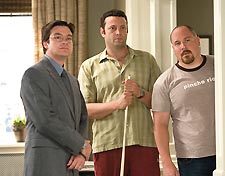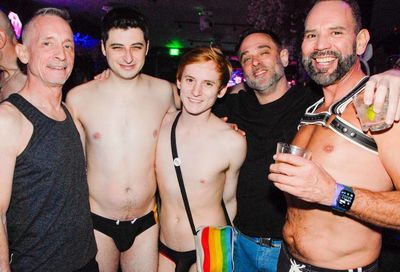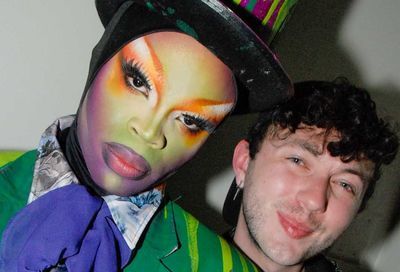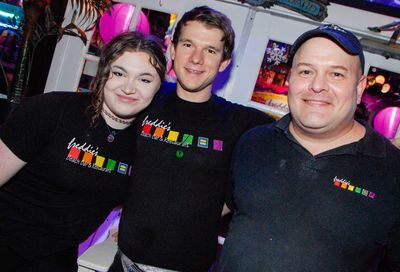Broken
'The Break-Up' is proof positive that a movie can be about absolutely nothing and still draw an audience
Early in The Break-Up, Brooke Meyers (Jennifer Aniston) asks her boyfriend, Gary Grobowski (Vince Vaughn), to help with the dishes after a dinner party. Absorbed in a game of Grand Theft Auto, he declines. When she turns up the heat, he reluctantly agrees to help. And she lays into him over his attitude.
”I want you to want to do the dishes,” she shouts.
”Why would I want to do the dishes?” he responds.
It’s a perfectly reasonable response — after all, who ever wants to do dishes? — but Brooke equates the desire to help out on the domestic front with being appreciated. Very quickly the argument gets very heated and very nasty and Brooke very abruptly — without really meaning it — puts an end to their relationship.
 Guy stuff: Jason Bateman, Vaughn and Favreau |
Brooke spends the next few weeks scheming how to put the brakes on an increasingly nasty, bitter, brutal break-up. But the wheels are in motion and there’s no stopping this train. So the couple, who co-own a condo, go out of their way to make every moment a living hell. It never seems to occur to Brooke — or Gary, for that matter — to take a direct, adult path, to sit down and perhaps say, ”I’m sorry, I overreacted and here’s how I feel. Let’s fix this.” Of course, if either of these two were to act like reasonable adults, there wouldn’t be much of a movie.
Not that there’s much of a movie in The Break-Up anyway. Director Peyton Reed struggles to make the most out of this loose-bound collection of scenes, but to little or no avail. There seems to be no purpose to The Break-Up other than to exhibit how a couple can make their last few weeks together achingly uncomfortable for one another, as well as their circle of friends.
For a movie like The Break-Up to truly succeed, it either has to traverse a dark path, like the one taken by the viciously funny War of the Roses, or it has to go the other way, unearthing in its narrative a happily-ever-after resolution. The Break-Up does neither. Instead, it settles on a mundane third act where Gary has an epiphany and grows up overnight, while Brooke has an epiphany of her own. Her story is far less interesting than his, since he learns to be less of a self-centered jerk and take the feelings of others — including his two brothers, with whom he runs a Chicago tour-bus business — into account. Her story is about fulfilling a need to travel.
Vaughn, who has fooled Hollywood into thinking he’s a real actor, has two basic styles: motor-riff quickly through dialogue or stand still and imitate a brick. He’s a true Tinseltown anomaly — a star who should have never been born, but who burns bright nonetheless. It’s inexplicable that he should be such a hot property.
I wish the same could be said for Aniston, who genuinely deserves the full movie stardom mantle, but who continues to select safe and reliably sound projects that keep her defined as our darling Rachel from Friends. (Her one exception: the marvelous indie The Good Girl.) Aniston has never appeared more radiant on screen, and yet her character in The Break-Up is beyond vexing. Brooke makes her bed and then decides not to lie in it, and when she finally achieves a major breakthrough with Gary, she does an about-face that completely derails any hope of us leaving the theater even remotely satisfied. Yes, folks, the sound you hear at the end of The Break-Up is the thud of an awful ending.
Vaughn and Aniston are supported by a terrific cast whose standouts include Judy Davis as Brooke’s boss, a grandly egomaniacal gallery owner, and Justin Long as the gallery’s stereotypically fey receptionist. Vincent D’Onofrio draws moments of depth out of Gary’s shy and withdrawn brother Dennis. It’s the difference between acting and showing up and reciting your lines, which pretty much is what Jon Favreau, as Gary’s best friend Johnny O, does. To be fair, Favreau has a great comic exchange late in the film, but it’s not enough to call his work here a success.
Ann-Margret is wasted as Brooke’s mother — she has one scene, and maybe five lines. What’s the point of paying for Ann-Margret if you’re not going to use her — or at least cover her in baked beans, chocolate and soap suds? (If you don’t get that, rent Ken Russell’s Tommy and prepare to see Ann-Margret in a whole new light.) And the movie could do with a lot more of John Michael Higgins, who turns in several extremely funny moments as Brooke’s a capella crazed, potentially gay brother.
As The Break-Up slogs along, we’re never quite sure whether or not to laugh or just sit there silently (the audience I saw it with, however, chose the latter). It’s enough to make you want to stand up and declare your independence, walking out on the film once and for all, never to return. Better you shouldn’t get involved with it in the first place.
Support Metro Weekly’s Journalism
These are challenging times for news organizations. And yet it’s crucial we stay active and provide vital resources and information to both our local readers and the world. So won’t you please take a moment and consider supporting Metro Weekly with a membership? For as little as $5 a month, you can help ensure Metro Weekly magazine and MetroWeekly.com remain free, viable resources as we provide the best, most diverse, culturally-resonant LGBTQ coverage in both the D.C. region and around the world. Memberships come with exclusive perks and discounts, your own personal digital delivery of each week’s magazine (and an archive), access to our Member's Lounge when it launches this fall, and exclusive members-only items like Metro Weekly Membership Mugs and Tote Bags! Check out all our membership levels here and please join us today!




















